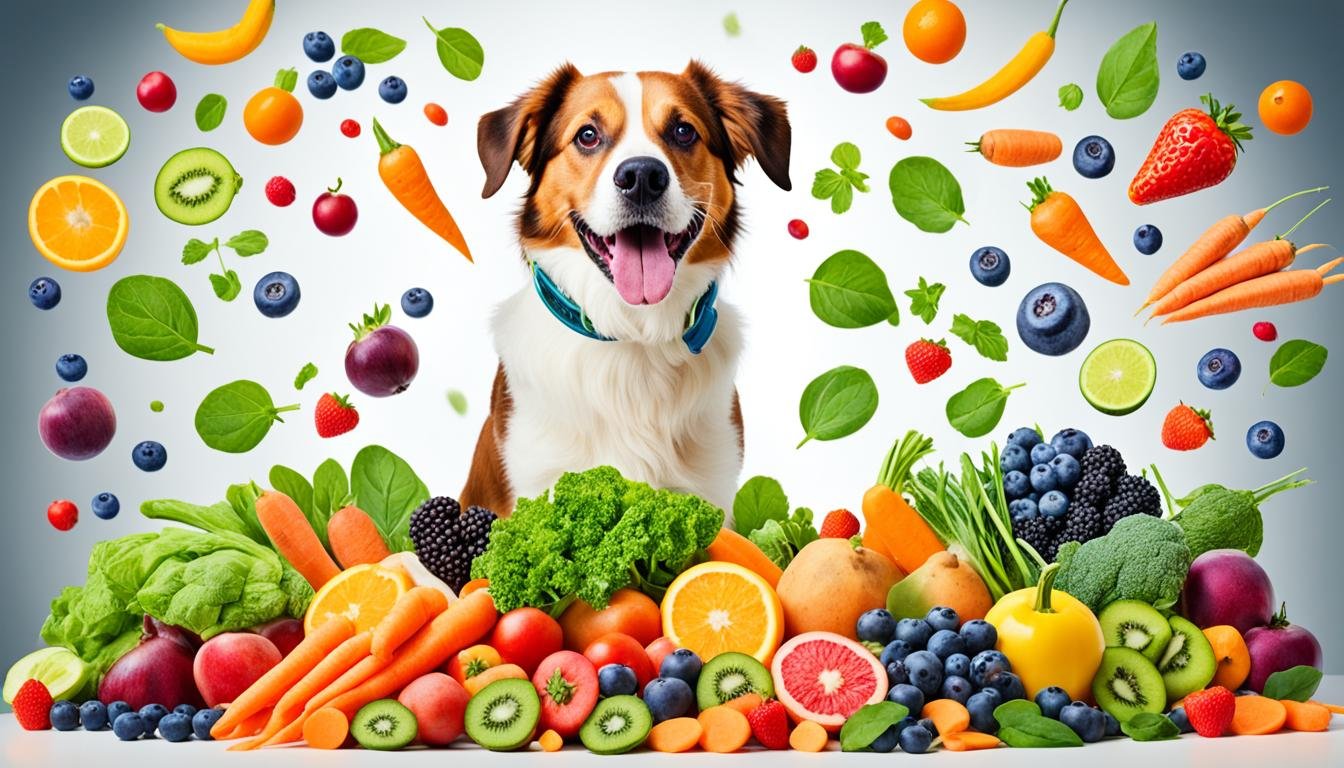Did you know that a single serving of broccoli contains a remarkable 11% of a dog’s daily fiber needs? Or that blueberries boast more antioxidants than their cranberry counterparts? As a dog owner, you want to provide your furry friend with the best possible nutrition to support their overall health and well-being. Introducing superfoods into your dog’s diet can be a game-changer, offering a powerful boost of essential vitamins, minerals, and other beneficial compounds.
While your dog’s commercial pet food likely provides the basic nutrients they need, incorporating certain fruits, vegetables, and other superfoods can take their health to the next level. From promoting a healthy immune system to supporting skin and coat condition, these nutrient-rich powerhouses can be a fantastic way to supplement your dog’s diet and help them thrive. This Beginner’s Guide to the Best Superfoods for Dogs will explore seven superfoods you can introduce to your canine companion, along with their health benefits and safe serving sizes.
Remember, it’s always a good idea to consult your veterinarian before making any significant changes to your dog’s diet, including the introduction of new foods. Your vet can provide guidance on the specific nutritional needs of your individual dog and ensure a smooth transition to a superfood-enhanced diet.
Key Takeaways
- Superfoods are nutrient-dense foods that can provide a powerful boost to your dog’s overall health and well-being.
- Incorporating superfoods like broccoli, dates, carrots, blueberries, and cranberries into your dog’s diet can offer a wide range of benefits.
- Consult your veterinarian before introducing any new foods to your dog’s diet to ensure they are suitable and safe for your pet.
- Be mindful of serving sizes and preparation methods when feeding your dog superfoods.
- Supplementing your dog’s diet with superfoods can be a great way to support their immune system, digestion, skin and coat health, and more.
Understanding Superfoods for Dogs
Superfoods are nutrient-rich foods that provide a high concentration of vitamins, minerals, antioxidants, and other beneficial compounds. They can be a fantastic way to supplement your dog’s diet and promote optimal health. Incorporating superfoods into your dog’s diet can offer a variety of benefits, such as supporting a healthy immune system, improving digestion, promoting skin and coat health, and providing an energy boost.
What Are Superfoods?
Superfoods for dogs are highly concentrated sources of essential nutrients, vitamins, minerals, and antioxidants that can have a profound impact on your furry friend’s overall well-being. These nutrient-dense foods are often considered among the best natural dog foods and healthy dog treats available, as they can provide a significant boost to your dog’s diet and health.
Benefits of Incorporating Superfoods in Your Dog’s Diet
By including dog superfoods in your canine companion’s diet, you can help support a range of health benefits, including:
- Strengthening the immune system
- Improving digestion and gut health
- Promoting healthy skin and a lustrous coat
- Providing an energy boost and overall wellness
Incorporating these nutrient-rich fruits and vegetables for dogs, as well as dog supplements, can be a simple yet effective way to enhance your dog’s nutrition and ensure they thrive.
| Superfood | Key Nutrients | Health Benefits |
|---|---|---|
| Broccoli | Vitamins C and K | Supports immune system and bone health |
| Dates | Fiber, potassium, magnesium | Promotes digestive and muscle function |
| Carrots | Beta-carotene, vitamin A | Enhances eye health and immune function |
| Blueberries | Antioxidants, fiber, vitamin C | Boosts immunity and digestive health |
| Cranberries | Fiber, vitamin C, antioxidants | Supports urinary tract health |
Broccoli: A Nutrient-Dense Superfood

Broccoli florets are packed with vitamins, minerals, and fiber, making them a superfood for both humans and dogs. Broccoli is an excellent source of vitamins C and K, which are essential for maintaining a healthy immune system and strong bones. It’s also a good source of fiber, which aids in digestion and gut health. Broccoli contains sulforaphane, a natural compound with potential anti-cancer properties.
Health Benefits of Broccoli for Dogs
The nutrients in broccoli can provide numerous health benefits for your canine companion. Vitamin C supports a strong immune system, while vitamin K is crucial for maintaining healthy bones. The fiber in broccoli can promote digestive regularity and overall gut health. Additionally, the sulforaphane in broccoli may have protective effects against certain diseases.
Safe Serving Sizes and Preparation Tips
When incorporating broccoli into your dog’s diet, it’s important to do so in moderation. A single floret, chopped into bite-sized pieces, is sufficient for a small dog, while larger dogs can handle two to three florets. It’s preferable to steam or boil broccoli before offering it to your dog, as raw broccoli could cause stomach upset. Always consult your veterinarian before introducing any new foods to your dog’s diet to ensure they are safe and appropriate for your pet’s individual needs.
Dates: A Sweet and Healthy Treat

Dates are a naturally sweet treat that can be a healthy alternative to sugary snacks for your dog. As part of a Beginner’s Guide to the Best Superfoods for Dogs, dates offer a range of nutritional benefits for canine companions. These dog superfoods are a good source of fiber, potassium, and magnesium, which can promote healthy digestion, muscle function, and nerve health. Dates also contain antioxidants that can help protect your dog’s cells from damage.
Nutritional Value of Dates for Dogs
The nutritional value of dates makes them a valuable addition to your dog’s natural dog food and dog diet. Fiber supports digestive health, while potassium and magnesium play crucial roles in maintaining proper muscle and nerve function. Antioxidants in dates can also provide an extra boost to your dog’s overall health and well-being.
Moderation and Pit Removal Precautions
When incorporating dates into your dog’s healthy dog treats, it’s important to offer them in moderation. A single, chopped date is a good portion size for most dogs. Be sure to remove the pit before feeding a date to your dog, as it can pose a choking hazard. Moderation is key, as dates are naturally high in sugar and should be limited to ensure a balanced dog nutrition plan.
Beginner’s Guide to the Best Superfoods for Dogs
Carrots: Crunchy and Vitamin-Packed
Crunchy, colorful carrots are a well-known low-calorie source of vitamins and minerals, making them a perfect superfood for dogs. Carrots are rich in beta-carotene, which is great for eye health. The body converts beta-carotene into vitamin A, which is essential for healthy vision, skin, and coat. Carrots are also a good source of fiber and antioxidants, providing a nutritional boost to your dog’s diet.
Blueberries: Antioxidant Powerhouses
Blueberries are antioxidant powerhouses that can benefit your dog’s immune system. These blueberries are brimming with antioxidants, which can help protect cells from damage and may reduce the risk of certain diseases. They are also a good source of fiber and vitamin C, which supports a healthy immune system.
Cranberries: Supporting Urinary Tract Health
Tart and tangy cranberries can be a beneficial addition to your dog’s diet. Cranberries are known for their potential benefits in promoting urinary tract health. The proanthocyanidins in cranberries may help prevent bacteria from adhering to the bladder wall. Cranberries are also a good source of fiber, vitamin C, and antioxidants, making them a valuable superfood for your canine companion.
Other Superfoods to Consider
In addition to the superfoods we’ve already explored, there are a few other nutrient-dense options worth considering for your dog’s diet. Chia seeds and flax are excellent sources of omega-3 fatty acids, which are vital for supporting your dog’s joint health, coat health, and skin health. These tiny seeds pack a powerful punch when it comes to promoting overall wellness for your canine companion.
Chia Seeds and Flax: Omega-3 Fatty Acids
Omega-3 fatty acids are essential for dogs, as they play a crucial role in maintaining healthy joints, reducing inflammation, and supporting the skin and coat. Chia seeds and flax are both natural, plant-based sources of these beneficial fats. Incorporate small amounts of chia seeds or ground flaxseed into your dog’s meals to ensure they’re getting the omega-3s they need for optimum health.
Sweet Potatoes: Packed with Vitamins and Minerals
Sweet potatoes are another superfood that can be a great addition to your dog’s natural dog food or dog treats. These vibrant tubers are packed with essential vitamins and minerals, including vitamins A, C, and B6, as well as iron and fiber. The high levels of vitamin A in sweet potatoes promote healthy vision, while the fiber supports digestive health. Sweet potatoes also contain calcium, necessary for strong bones and teeth, as well as a healthy nervous system. Consult your veterinarian for the appropriate serving size for your dog.
Conclusion
Incorporating superfoods into your dog’s diet can be a great way to provide them with a nutritional boost and support their overall health and well-being. From broccoli and dates to carrots and blueberries, these nutrient-dense foods offer a wealth of benefits for your furry friend. Remember to introduce new foods gradually and consult with your veterinarian to ensure you’re meeting your dog’s specific dietary needs. By making superfoods a part of your dog’s diet, you can help them thrive and enjoy a long, healthy life.
The incorporation of dog superfoods such as natural dog food, fruits and vegetables for dogs, and dog supplements can provide a significant boost to your canine companion’s nutrition and overall well-being. By leveraging the power of these healthy dog treats, you can support your dog’s dog nutrition and help them achieve optimal health and longevity.
Ultimately, the Beginner’s Guide to the Best Superfoods for Dogs has highlighted the potential of dog superfoods to elevate your pet’s dog diet and promote their long-term well-being. Embrace this knowledge and incorporate these nutritional powerhouses into your dog’s routine for a healthier, happier, and more vibrant future together.
FAQ
What are superfoods for dogs?
Superfoods for dogs are nutrient-rich foods that provide a high concentration of vitamins, minerals, antioxidants, and other beneficial compounds. They can be a fantastic way to supplement your dog’s diet and promote optimal health.
What are the benefits of incorporating superfoods into a dog’s diet?
Incorporating superfoods into your dog’s diet can offer a variety of benefits, such as supporting a healthy immune system, improving digestion, promoting skin and coat health, and providing an energy boost.
How much broccoli can I feed my dog?
A single floret, chopped into bite-sized pieces, is sufficient for a small dog, while larger dogs can handle two to three florets. It’s preferable to steam or boil broccoli before offering it to your dog, as raw broccoli could cause stomach upset.
Can I give my dog dates?
Yes, dates can be a healthy alternative to sugary snacks for your dog. A single, chopped date is a good portion size for most dogs. Be sure to remove the pit before feeding a date to your dog, as it can be a choking hazard.
What are the benefits of carrots, blueberries, and cranberries for dogs?
Carrots are rich in beta-carotene, which is great for eye health. Blueberries are antioxidant powerhouses that can benefit your dog’s immune system. Cranberries are known for their potential benefits in promoting urinary tract health.
How can chia seeds, flax, and sweet potatoes benefit my dog’s health?
Chia seeds and flax are good sources of omega-3 fatty acids, which are vital for joint health, coat health, and skin health. Sweet potatoes are full of essential vitamins and minerals necessary for a well-rounded diet, strong digestive health, and good overall health.







